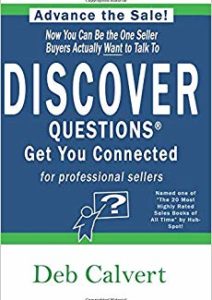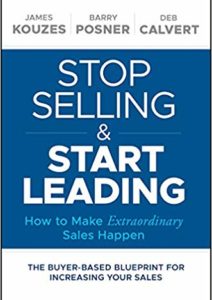We recently interviewed top sales expert, bestselling author and leading sales and executive coach Deb Calvert on several topics of her expertise, including her new book Stop Selling and Start Leading. The interview gives some fascinating insight into sales questions, teamwork, and the amazing power of leadership in sales.
1. The name of your company is People First Productivity Solutions. Tell us why you gave the company that name, and how that philosophy influences your business solutions.
The Fortune 500 company I worked for closed its doors 12 years ago. I’d seen some practices in businesses that seemed to overlook the importance of people. A hyper-vigilant focus on processes, products and profits left people out in the cold. I wanted to do things differently, to bring a “people first” perspective to business. Since then, we’ve been building organizational strength by putting people first. For any company that wants to increase profits, improve products, or implement processes, PEOPLE are essential. When people are ennobled and engaged, they develop an emotional commitment that causes them to apply additional discretionary effort to their work. Our business solutions focus on building those emotional commitments that unleash a torrent of business-boosting results that include higher levels of employee retention, improved productivity rates, increases in customer satisfaction, and improved profit margins.
2. You wrote a whole book, and have written a number of articles, on the topic of asking the right questions in sales. Tell us why this factor takes such an important role in sales.
Questions matter in sales and in every kind of relationship. In sales, questions create value in an instant by making buyers think about things that matter to them. Questions also reveal what sellers care about, how they will conduct themselves in business, and whether or not they are trustworthy. Questions advance the sale and give sellers a way to understand and meet buyer needs. Purposeful questions that are well-constructed and properly sequenced cause buyers to prefer the sellers who ask them. My first book, DISCOVER Questions® Get You Connected, is based on over 20 years of interviews with buyers and observations on thousands of sales calls.
3. Another topic that frequently shows up in your writing is teamwork. In some respects, this would seem counterintuitive given the “lone wolf” nature of sales sometimes. Tell us how teamwork is important to sales, especially today.
It all boils down to connecting with people. Even lone wolf sellers must rely on internal team members to execute orders. Teams of buyers are more common today than single buyers, too, so that increases the need to be team-oriented. The complexity of sales in modern times puts a lot of burden on sellers, and those who don’t delegate and collaborate with others will become less effective. On top of all that, there are increasing needs inside organizations to create customer experiences that include more than the seller’s solo contact with a buyer. Account-based marketing (ABM) requires more than a single entry point, for example. Sellers must stay in touch with their marketing colleagues, SDRs or others in sales support and fulfillment roles, managers/coaches/trainers, and each other if they are to continually learn and grow.
4. Tell us about your new book, Stop Selling & Start Leading, and what led you to write it.
In my business, we focus in three areas where connections between people are vital: sales, teamwork and leadership. In my leadership work, I have been very fortunate to be affiliated with Jim Kouzes and Barry Posner, authors of The Leadership Challenge® and two of the most highly-esteemed people in the field of leadership development. Their work provides an evidence-based framework called The Five Practices of Exemplary Leadership®. I’ve admired and taught this for many years, and I realized that the same leadership practices might have some appeal to buyers if their sellers would adopt these practices. So we conducted a research study with buyers and surveyed sellers, too, about these Five Practices. Our findings were rather remarkable — buyers absolutely do want sellers to behave as leaders. We wrote Stop Selling & Start Leading to explain, from the buyer perspective, how sellers could make extraordinary sales happen by behaving more like leaders. It’s the blueprint for seller behaviors based on buyer research.
5. How can people get the new book?
It’s available for pre-order on all the major retailers’ online sites. We’re also offering some very generous extended learning packages on the web page — this is for teams that want to bring in a kick-off or event speaker, teams that want a webinar or training, and senior leaders who are interested in supplemental coaching in addition to book orders. Of course, anyone who’s interested can also contact me directly about bulk orders. There’s more than a book here — this has become a movement as sellers everywhere are eager to understand more about what it is that buyers want from them.













Comments